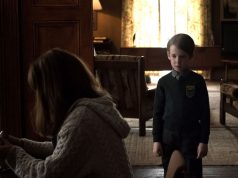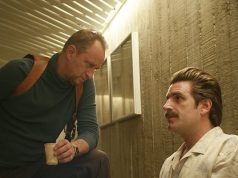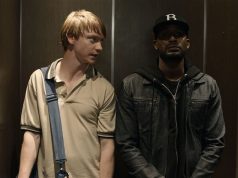“East is east and west is west and ne’er the twain shall meet,” is the poet’s line, I believe, and it’s a good reference point for the title of this British film, about a Pakistani man who marries a British woman and tries to raise their children as Muslim, even while living in a Christian nation.
Set in 1971, the film begins with the seven teen-age children of George (Om Puri) and Ella (Linda Bassett) Khan participating in a Good Friday parade. Ella watches from the sidelines, beaming, then suddenly cries out the alert: “Your father is coming!” Quickly, the children ditch the parade and hide in an alley until the danger has passed, whereupon they rejoin the procession.
Dad doesn’t want them participating in Christianity (or even in Western society, really), but the mischievous, playful children do whatever they can behind his back. It’s that cheeky attitude that carries this warm, witty film through its various dramas and crises.
When oldest son Nazir (Ian Aspinall) leaves his Muslim bride at the altar (partly because he doesn’t love her, partly because he doesn’t want a traditional Muslim life, and partly because he’s gay), George declares that he is dead. From then on, the Khans have only five sons, not six.
The next crisis is when the youngest boy, Sajid (Jordan Routledge), after an incident of public urination at Muslim school, is discovered to be uncircumcised. This must be taken care of immediately. After it, the very next thing we see are his brothers and sister eating sausages –already humorous because pork is a no-no and they’ll have to rid the house of the scent before Dad gets home, but also funny because of the intentional connection with the circumcision. (The next scene after the sausage episode starts with a fish having its head cut off at the family’s fish-n-chips shop — more semi-juvenile but somehow refined humor relating to the circumcision.)
The meat of the film (sorry) is when George arranges marriages for his two oldest “living” sons, Abdul (Raji James) and Tariq (Jimi Mistry). In Muslim tradition this is all done by the parents, with no input from the children. Not only is the lack of choice appalling to the boys, as will be the forced life of Islam, but to make it worse, the girls chosen for them are ferociously ugly. Abdul, a sensitive lad, is willing to bite the bullet and go through with it to make his father happy, but rebellious Tariq (already seeing a local British girl on the side), will have none of it.
The other family’s visit to the Khan home, during which the particulars of the marriage are to be discussed, plays out like an obscene “I Love Lucy” vignette (actually, given its outrageous climax, which involves a piece of anatomically correct art created by cute son Saleem (Chris Bisson), it’s probably more reminiscent of “Seinfeld”). It’s your basic “boss comes to dinner, and the family embarrasses you” situation, and we’ve seen it enough before to recognize it here before it even starts. It’s still a little surprising, though: “East Is East” has been so genuinely original and creative up to this point, especially in its portrayal of a realistically funny family, that it seems odd to devolve into a hackneyed sit-com so late in the game.
Overlooking that, though, the film does remarkably well. Where the sit-com would use the arranged-marriage fiasco as a means of making Dad see that he’s been wrong all along, “East Is East” doesn’t do that. He realizes there must be some compromise, that he can’t go on ruling with an iron Pakistani fist anymore, and that he certainly can’t go on hitting his wife and children (there’s one incident of this in the film, and it seems to come out of nowhere). But he doesn’t intend to give up his Muslim heritage altogether, either, nor should he. The film allows for the very realistic fact that while something must be done to solve all these problems, no one knows exactly what to do. All they know is, it’s not going to be easy. Thank goodness for humor and love to help them (and us) get through.
A- (; )





